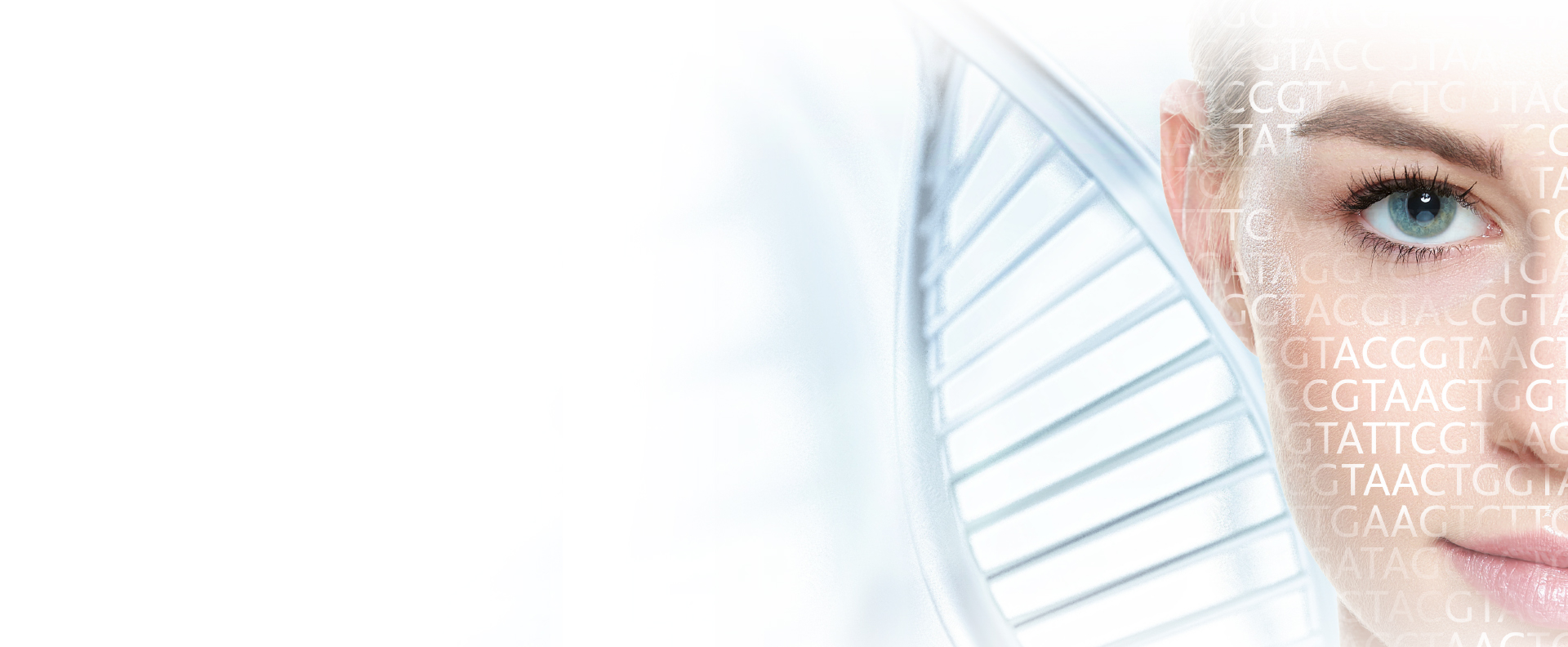IllnessCockayne syndrome
Summary
Comprehensive differential diagnostic panel for Cockayne syndrome comprising 2 guideline-curated and altogether 8 curated genes according to the clinical signs
| Locus type | Count |
|---|---|
| Gen | 8 |
- (Extended panel: incl. additional genes)
- EDTA-anticoagulated blood (3-5 ml)
NGS +
Loci
Informations about the disease
Multisystem condition with short stature, characteristic face, premature aging, photosensitivity, progressive neurological dysfunction, intellectual deficit
- Cockayne syndrome spectrum
- Sy: Cachectic dwarfism, cutaneous photosensitivity, thin, dry hair, progeroid appearance
- Allelic: Cerebrooculofacioskeletal syndrome 1 (ERCC6)
- Allelic: Cerebrooculofacioskeletal syndrome 2 (ERCC2)
- Allelic: Cerebrooculofacioskeletal syndrome 3 (ERCC5)
- Allelic: Cerebrooculofacioskeletal syndrome 4 (ERCC1)
- Allelic: De Sanctis-Cacchione syndrome (ERCC6)
- Allelic: Fanconi anemia, complementation group Q (ERCC4)
- Allelic: Lung cancer, susceptibility to (ERCC6)
- Allelic: Macular degeneration, age-related, susceptibility to, 5 (ERCC6)
- Allelic: Premature ovarian failure 11 (ERCC6)
- Cockayne syndrome, type A (ERCC8)
- Cockayne syndrome, type B (ERCC6)
- Trichothiodystrophy 1, photosensitive (ERCC2)
- Trichothiodystrophy 2, photosensitive (ERCC3)
- UV-sensitive syndrome 1 (ERCC6)
- UV-sensitive syndrome 2 (ERCC8)
- Xeroderma pigmentosum, group B (ERCC3)
- Xeroderma pigmentosum, group D (ERCC2)
- Xeroderma pigmentosum, group E, DDB-negative subtype (DDB2)
- Xeroderma pigmentosum, group F (ERCC4)
- Xeroderma pigmentosum, group G (ERCC5)
- Xeroderma pigmentosum, group G/Cockayne syndrome (ERCC5)
- Xeroderma pigmentosum, type F/Cockayne syndrome (ERCC4)
- AR
- Multiple OMIM-Ps
Bioinformatics and clinical interpretation
Test-Stärken
- DAkkS-akkreditiertes Labor
- EU-Richtlinie für IVD in Umsetzung
- Qualitäts-kontrolliert arbeitendes Personal
- Leistungsstarke Sequenzierungstechnologien, fortschrittliche Target-Anreicherungsmethoden und Präzisions-Bioinformatik-Pipelines sorgen für überragende analytische Leistung
- Sorgfältige Kuratierung klinisch relevanter und wissenschaftlich begründeter Gen-Panels
- eine Vielzahl nicht Protein-kodierender Varianten, die in unseren klinischen NGS-Tests mit erfasst werden
- unser strenges Variantenklassifizierungsschema nach ACMG-Kriterien
- unser systematischer klinischer Interpretations-Workflow mit proprietärer Software ermöglicht die genaue und nachvollziehbare Verarbeitung von NGS-Daten
- unsere umfassenden klinischen Aussagen
Testeinschränkungen
- Gene mit eingeschränkter Abdeckung werden gekennzeichnet
- Gene mit kompletten oder partiellen Duplikationen werden gekennzeichnet
- es wird angenommen, dass ein Gen suboptimal abgedeckt ist, wenn >90% der Nukleotide des Gens bei einem Mapping-Qualitätsfaktor von >20 (MQ>20) nicht abgedeckt sind
- die Sensitivität der Diagnostik zur Erkennung von Varianten mit genannten Testeinschränkungen ist möglicherweise begrenzt bei:
- Gen-Konversionen
- komplexe Inversionen
- Balancierte Translokationen
- Mitochondriale Varianten
- Repeat-Expansionen, sofern nicht anders dokumentiert
- nicht kodierende Varianten, die Krankheiten verursachen, die von diesem Panel nicht mit abgedeckt werden
- niedriger Mosaik-Status
- Repeat-Blöcke von Mononukleotiden
- Indels >50bp (Insertionen-Deletionen)
- Deletionen oder Duplikationen einzelner Exons
- Varianten innerhalb von Pseudogenen
- die analytische Sensitivität kann geringer ausfallen werden, wenn die DNA nicht von amedes genetics extrahiert wurde
Laboratory requirement
Die in grün gezeigten Gene sind kuratiert und werden als Gen-Panel untersucht. Eine Erweiterung des Panels (blau gezeigte Gene, jeweils ebenfalls kuratiert) kann auf Anfrage erfolgen. Sofern unter "Erweitertes Panel" ein Minuszeichen angezeigt wird, sind nur Core-/Basis-Gene verfügbar.
Für die Anforderung einer genetischen Untersuchung senden Sie uns bitte die Krankheits-ID auf einem Überweisungsschein. Bitte die Material-Angabe beachten.
Für privat versicherte Patienten empfehlen wir einen Antrag auf Kostenübernahme bei der Krankenversicherung.
Die Untersuchung wird auch für Selbstzahler angeboten.

